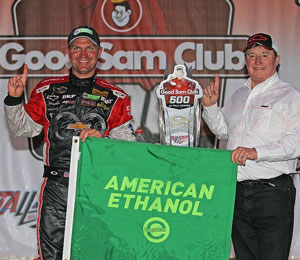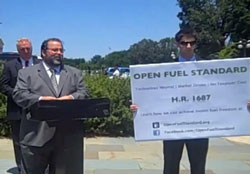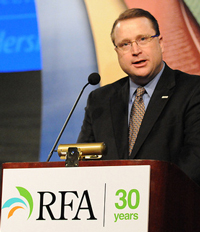A new U.S. Department of Agriculture (USDA) report finds that the ethanol co-product known as distillers grains or DDGS is replacing even more corn and soybean meal in livestock and poultry feed rations than previously thought.
 According to the report by USDA’s Economic Research Service (ERS), “We found that, on average, for the past 5 crop years (2006/07-2010/11), 1 mt of distillers’ grains substitutes for about 1.22 mt of corn and soybean meal combined in the United States.”
According to the report by USDA’s Economic Research Service (ERS), “We found that, on average, for the past 5 crop years (2006/07-2010/11), 1 mt of distillers’ grains substitutes for about 1.22 mt of corn and soybean meal combined in the United States.”
The report also noted that “Feed market impacts of increased corn use for ethanol are smaller than that indicated by the total amount of corn used for ethanol production because of DDGS.” In fact, ERS found the amount of feed (corn and soybean meal) replaced by the DDGS represents nearly 40 percent (on a weight basis) of the corn used in the associated ethanol production process for a given crop year.
“The value of the animal feed produced by the ethanol industry has long been misunderstood, understated and misrepresented,” said Geoff Cooper, Renewable Fuels Association Vice President of Research & Analysis. “Distillers grains continue to be the industry’s best kept secret, despite the fact that we are producing tremendous volumes of this high value feed product today. DDGS and other ethanol feed products significantly reduce the need for corn and soybean meal in animal feed rations. Over the past several years, distillers grains have been one of the most economically competitive sources of energy and protein available on the world feed market. While some critics of the ethanol industry attempt to downplay the role of DDGS, the facts simply can’t be ignored.”
RFA believes the report has important implications for discussions regarding ethanol’s impact on feed grains availability, feed prices, land use effects, and the greenhouse gas (GHG) impacts of producing corn ethanol.


 The monthly Moderated Transaction System (EMTS) data from EPA is used to track requirements under the expanded Renewable Fuel Standard (RFS2) program for use of renewable fuels and Renewable Identification Number (RIN) transactions.
The monthly Moderated Transaction System (EMTS) data from EPA is used to track requirements under the expanded Renewable Fuel Standard (RFS2) program for use of renewable fuels and Renewable Identification Number (RIN) transactions.

 “Americans need a choice at the pump and the Open Fuel Standard would allow them to pick an ethanol blend that meets their needs,” said
“Americans need a choice at the pump and the Open Fuel Standard would allow them to pick an ethanol blend that meets their needs,” said  A
A  The
The  The
The  Chuck Woodside, General Manager of farmer-owned
Chuck Woodside, General Manager of farmer-owned  Woodside thinks 2011 has been a positive year for ethanol production, despite the policy challenges the industry continues to face, and he is optimistic about the future, even as they expect the Volumetric Ethanol Excise Tax Credit (VEETC) to expire at the end of the year for good. “There will be some transition, but I think the industry is confident we can compete with gasoline without the tax credit,” he said. “The VEETC was an incredibly successful program and we think there’s opportunities to build on that investment that the taxpayers made in our industry.”
Woodside thinks 2011 has been a positive year for ethanol production, despite the policy challenges the industry continues to face, and he is optimistic about the future, even as they expect the Volumetric Ethanol Excise Tax Credit (VEETC) to expire at the end of the year for good. “There will be some transition, but I think the industry is confident we can compete with gasoline without the tax credit,” he said. “The VEETC was an incredibly successful program and we think there’s opportunities to build on that investment that the taxpayers made in our industry.” The message is that consumers who use oilheat to heat their homes have the power to change – without changing a thing – by choosing Bioheat®, “a home heating fuel made with biodiesel, a renewable, cleaner-burning fuel that supports American jobs.”
The message is that consumers who use oilheat to heat their homes have the power to change – without changing a thing – by choosing Bioheat®, “a home heating fuel made with biodiesel, a renewable, cleaner-burning fuel that supports American jobs.”